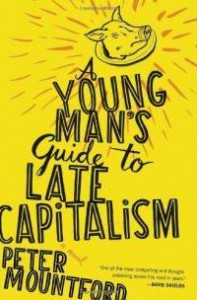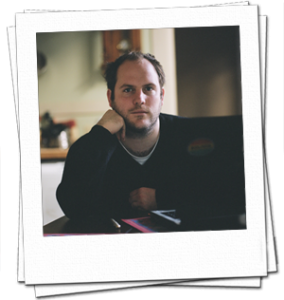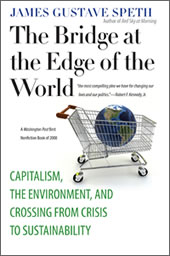Peter Mountford: A Young Man’s Guide to Late Capitalism
May 10, 2011 by David
Filed under Fiction, WritersCast
 978-0-547-47335-2 – Houghton Mifflin Harcourt – paperback – $15.95 (ebook versions available)
978-0-547-47335-2 – Houghton Mifflin Harcourt – paperback – $15.95 (ebook versions available)
I read about this book a few months ago and knew from the title alone that I wanted to read this novel. How many political novels are there (readable ones anyway)? Well, it turns out that Peter Mountford is a terrific writer, and A Young Man’s Guide to Late Capitalism is a very special debut novel, completely captivating and very subtle, even as it takes on some of the characteristics of a French farce (with the requisite literal and figurative doors opening and closing throughout).
The book is about Gabriel, a young former reporter, not that long out of Brown, now operating as a covert hedge fund analyst in Bolivia, which is on the verge of electing a new populist president. Gabriel’s new job pays him incredibly well and puts him in the position of lying to absolutely everyone in his life, from his mother, a famous Chilean exile writer/professor (and a political radical), to all the journalists he cultivates, the older woman reporter he sleeps with, the young and beautiful press attache of the president to be (with whom he falls in love), to Evo (the presidential candidate himself) and everyone else in between.
One of the strengths of this novel is that there are so many well crafted characters in this novel who actually matter to the story – though I admit there were times while I was reading that I had trouble keeping them all straight. Another strength of the novel is Mountford’s portrait of Bolivia itself. He weaves it beautifully into Gabriel’s story, and gives the country a wonderful character and strength.
This story is of course all about power and money in modern high level capitalism, and what they do to the hearts and souls of the individuals caught in its web. But Mountford resists making it easy for his characters or for us. Choices are not simple, causes and effects are complex, and yes, morality is often the primary casualty. But we do end up feeling deeply for Gabriel and understanding his choices, even if we find them difficult to accept. In that way, Peter Mountford has created a truly sympathetic character in a real life story, it’s one we recognize, understand, and must wonder how much of ourselves we see in it.
I really enjoyed having the opportunity to discover and read this book and talk to Peter Mountford while he was in the midst of his book launch tour. He’s an energetic talker about his work, which made our conversation great fun. I think you will enjoy our talk, and hopefully the book as well. I’m looking forward to his next book too – this is a writer we will want to hear more from. He’s a real find for anyone who likes to read new voices in modern fiction.
He’s a real find for anyone who likes to read new voices in modern fiction.
Podcast: Play in new window | Download
James Gustav Speth: The Bridge at the Edge of the World: Capitalism, the Environment, and Crossing from Crisis to Sustainability
August 30, 2009 by David
Filed under Non-Fiction
 978-0300151152 – paperback – Yale University Press – $18.00
978-0300151152 – paperback – Yale University Press – $18.00
While I was reading The Bridge at the Edge of the World, I often would exclaim out loud as so many of the ideas the author talks about are ones I believe in and feel are important to the dialog about the future of our planet. This is an important book that should be widely read, discussed and used as the basis of action – and soon!
Co-founder of the NRDC, former Yale University dean, and former White House advisor James Gustave Speth has been a leader in the environmental movement for more than 30 years.
Now, faced with overwhelming evidence of galloping degradation of the planet, Speth has concluded that the environmental project—his project—has failed. No matter how hard environmentalists work, the current of destruction against which they are swimming is simply too swift. In order to preserve a livable planet for future generations, Speth argues in The Bridge at the Edge of the World that the current itself must be altered. And the current is that untouchable edifice, American-style consumer capitalism.
I found this book to be powerful and compelling and wanted to talk to “Gus” Speth about the implications of his thinking. How should we go forward when we know that the way we live today is putting us on a collision course with the natural world? How do we build new ways of living that are sustainable? And how are we going to do this in the face of so many entrenched interests that will oppose the essential changes we feel are necessary for human survival and for the preservation natural systems in a viable planet earth?
While this interview is perhaps all too brief, Speth talks in depth about some of his ideas and answers my questions with his typical incisiveness and intelligence.
Podcast: Play in new window | Download
